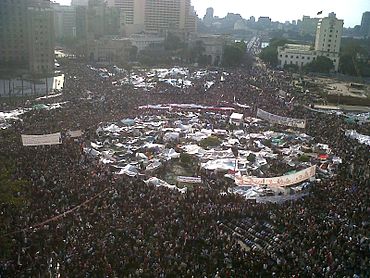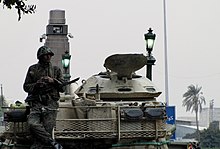
Back ثورة 25 يناير Arabic ثورة 25 يناير ARZ Misir inqilabı (2011) Azerbaijani میصر اینقیلابی AZB Рэвалюцыя ў Егіпце (2011) Byelorussian Эгіпецкая рэвалюцыя 2011 году BE-X-OLD Египетска революция (2011) Bulgarian Protesti u Egiptu (2011) BS Revolució egípcia de 2011 Catalan Egyptská revoluce 2011 Czech
| 2011 Egyptian revolution | |||
|---|---|---|---|
| ثورة ٢٥ يناير (Arabic) Part of the Egyptian Crisis, the Arab Spring, and the Iran–Saudi Arabia proxy conflict | |||
 Demonstrators in Cairo's Tahrir Square on 8 February 2011 | |||
| Date | 25 January 2011 – 11 February 2011 (2 weeks and 3 days) | ||
| Location | 30°2′40″N 31°14′8″E / 30.04444°N 31.23556°E | ||
| Caused by | |||
| Goals |
| ||
| Methods | |||
| Resulted in |
| ||
| Parties | |||
| Lead figures | |||
| Number | |||
| 2,000,000 at Cairo's Tahrir Square See: Regions section below. | |||
| Casualties | |||
| Death(s) |
| ||
| Injuries | 6,467 people[18] | ||
| Arrested | 12,000[19] | ||
| Part of a series on the Egyptian Crisis (2011–2014) |
|---|
 |
|
|
The 2011 Egyptian revolution, also known as the 25 January Revolution (Arabic: ثورة ٢٥ يناير, romanized: Thawrat khamsa wa-ʿišrūn yanāyir;),[20] began on 25 January 2011 and spread across Egypt. The date was set by various youth groups to coincide with the annual Egyptian "Police holiday" as a statement against increasing police brutality during the last few years of Hosni Mubarak's presidency. It consisted of demonstrations, marches, occupations of plazas, non-violent civil resistance, acts of civil disobedience and strikes. Millions of protesters from a range of socio-economic and religious backgrounds demanded the overthrow of Egyptian President Hosni Mubarak. Violent clashes between security forces and protesters resulted in at least 846 people killed and over 6,000 injured.[21][22] Protesters retaliated by burning over 90 police stations across the country.[23]
The Egyptian protesters' grievances focused on legal and political issues,[24] including police brutality, state-of-emergency laws,[1] lack of political freedom, civil liberty, freedom of speech, corruption,[2] high unemployment, food-price inflation[3] and low wages.[1][3] The protesters' primary demands were the end of the Mubarak regime. Strikes by labour unions added to the pressure on government officials.[25] During the uprising, the capital, Cairo, was described as "a war zone"[26] and the port city of Suez saw frequent violent clashes. Protesters defied a government-imposed curfew, which the police and military could not enforce in any case. Egypt's Central Security Forces, loyal to Mubarak, were gradually replaced by military troops. In the chaos, there was looting by rioters which was instigated (according to opposition sources) by plainclothes police officers. In response, watch groups were organised by civilian vigilantes to protect their neighborhoods.[27][28][29][30][31]
On 11 February 2011, Vice President Omar Suleiman announced that Mubarak resigned as president, turning power over to the Supreme Council of the Armed Forces (SCAF).[32] The military junta, headed by effective head of state Muhammad Tantawi, announced on 13 February that the constitution is suspended, both houses of parliament dissolved and the military would govern for six months (until elections could be held). The previous cabinet, including Prime Minister Ahmed Shafik, would serve as a caretaker government until a new one was formed.[33]
After the revolution against Mubarak and a period of rule by the Supreme Council of the Armed Forces, the Muslim Brotherhood took power in Egypt through a series of popular elections, with Egyptians electing Islamist Mohamed Morsi to the presidency in June 2012, after winning the election over Ahmed Shafik.[34] However, the Morsi government encountered fierce opposition after his attempt to pass an Islamic-leaning constitution. Morsi also issued a temporary presidential decree that raised his decisions over judicial review to enable the passing of the constitution.[35] It sparked general outrage from secularists and members of the military, and a revolution broke out against his rule on 28 June 2013.[36] On 3 July 2013, Morsi was deposed following the army's intervention on the side of the revolution. The move was led by the minister of defense, General Abdel Fattah el-Sisi,[37] as millions of Egyptians took to the streets in support of early elections.[38] Sisi went on to become Egypt's president after an election in 2014 which was boycotted by opposition parties.[39]
- ^ a b c d e "Egypt braces for nationwide protests". France 24. Agence France-Presse. 25 January 2011. Archived from the original on 1 February 2011. Retrieved 29 January 2021.
- ^ a b c "Egypt activists plan biggest protest yet on Friday". Al Arabiya. 27 January 2011. Archived from the original on 1 February 2011. Retrieved 29 January 2011.
- ^ a b c d e "Egypt protests a ticking time bomb: Analysts". The New Age. South Africa. Agence France-Presse. 27 January 2011. Archived from the original on 9 February 2011. Retrieved 29 January 2011.
- ^ Korotayev, A.; Zinkina, J. (2011). "Egyptian Revolution: A Demographic Structural Analysis". Entelequia. Revista Interdisciplinar. 13: 139–169.
- ^ "Egypt's prime minister quits, new govt soon-army". Forexyard.com. Archived from the original on 1 May 2011. Retrieved 5 March 2011.
- ^ Egypt's Mubarak Steps Down; Military Takes Over, The Wall Street Journal, 11 February 2011.
- ^ "Egypt's military moves to dissolve parliament, suspend constitution". Haaretz. Reuters. 29 November 2010. Archived from the original on 14 February 2011. Retrieved 24 February 2011.
- ^ "Egyptian state security disbanded". 15 March 2011. Archived from the original on 16 March 2011. Retrieved 15 March 2011.
- ^ "Egypt dissolves former ruling party". Al Jazeera. 16 April 2011.
- ^ "How the mighty have fallen". Al-Ahram Weekly. 2 February 2011. Archived from the original on 1 May 2011. Retrieved 23 March 2011.
- ^ Kirkpatrick, David D.; Stack, Liam (13 March 2011). "Prosecutors Order Mubarak and Sons Held". The New York Times. Archived from the original on 16 April 2011. Retrieved 13 April 2011.
- ^ "Mubarak to be tried for murder of protesters". Reuters. 24 May 2011. Archived from the original on 31 May 2011. Retrieved 24 May 2011.
- ^ "Egypt's state of emergency ends after 31 years". The Daily Telegraph. London. 31 May 2012.
- ^ "Mohammed Morsi sworn in as Egypt's president". CBS News. 30 June 2012. Retrieved 17 November 2012.
- ^ "846 killed in Egypt uprising". Haaretz. 20 April 2011. Archived from the original on 20 April 2011. Retrieved 20 April 2011.
- ^ "924 killed in Egyptian Revolution". 31 December 2011. Archived from the original on 6 January 2012. Retrieved 31 December 2011.
- ^ "Activists on Facebook: the military killed 99 and wounded 2702 in 10 months". Tahrirnews.com. 30 December 2011. Archived from the original on 5 September 2015. Retrieved 6 January 2012.
- ^ "Egypt's revolution death toll rises to 384". Al Masry Al Youm. 22 February 2011. Archived from the original on 14 March 2011. Retrieved 22 February 2011.
- ^ Faisal Al Yafai (12 November 2012). "Egypt's army fails to grasp the post-Mubarak realities – The National". Thenational.ae. Retrieved 17 November 2012.
- ^ Egyptian-American leaders call for U.S. support of 'Lotus Revolution' – CNN.com. Edition.cnn.com. Retrieved on 2013-12-06.
- ^ "شيحة: مكاتب الصحة وثقت سقوط 840 شهيداً خلال ثورة 25 يناير". Almasry-alyoum.com. 16 March 2011. Archived from the original on 29 April 2011. Retrieved 4 April 2011.
- ^ "Egypt: Cairo's Tahrir Square fills with protesters". BBC. 8 July 2011. Archived from the original on 9 July 2011. Retrieved 11 July 2011.
- ^ "Was the Egyptian revolution really non-violent?". Egypt Independent. 24 January 2012. Retrieved 25 March 2013.
- ^ "Q&A: What's Behind the Unrest?". SBS. 27 January 2011. Retrieved 29 January 2011.
- ^ "Trade unions: the revolutionary social network at play in Egypt and Tunisia". Defenddemocracy.org. Archived from the original on 13 February 2011. Retrieved 11 February 2011.
- ^ Siddique, Haroon; Owen, Paul; Gabbatt, Adam (25 January 2011). "Protests in Egypt and unrest in Middle East – as it happened". The Guardian. UK. Archived from the original on 26 January 2011. Retrieved 26 January 2011.
- ^ Fleishman, Jeffrey and Edmund Sanders (Los Angeles Times) (29 January 2011). "Unease in Egypt as police replaced by army, neighbors band against looters". The Seattle Times. Archived from the original on 1 February 2011. Retrieved 1 February 2011.
- ^ "Looting spreads in Egyptian cities". Al Jazeera. 29 January 2011. Archived from the original on 31 January 2011. Retrieved 1 February 2011.
- ^ Hauslohner, Abigail (29 January 2011). "The Army's OK with the Protesters, for now". Time. Archived from the original on 31 January 2011. Retrieved 1 February 2011.
- ^ "Mubarak plays last card, the army; Police vanish". World Tribune (online). 31 January 2011. Archived from the original on 1 February 2011. Retrieved 1 February 2011.
- ^ Stirewalt, Chris (31 January 2011). "Egypt: From Police State to Military Rule". Fox News Channel. Archived from the original on 1 February 2011. Retrieved 1 February 2011.
- ^ "Hosni Mubarak resigns as president". Al Jazeera. 11 February 2011.
- ^ el-Malawani, Hania (13 February 2011). "Egypt's military dismantles Mubarak regime". The Sydney Morning Herald.
- ^ "Muslim Brotherhood's Mohamed Morsi declared president of Egypt". The Guardian. 24 June 2012. Retrieved 9 January 2015.
- ^ Kirkpatrick, David D.; Sheikh, Mayy El (22 November 2012). "President Morsi in Egypt Seizes New Powers". The New York Times. Retrieved 9 May 2018.
- ^ Taylor, Alan. "Millions March in Egyptian Protests". The Atlantic. Retrieved 2 May 2017.
- ^ "Morsi ousted, under house arrest, as crowds celebrate in Cairo". NBC News. 3 July 2013. Retrieved 9 January 2015.
- ^ "The Simplest Explanation of Egypt's Revolution You'll Ever Read". TakePart. Archived from the original on 9 May 2017. Retrieved 2 May 2017.
- ^ "Sisi elected Egypt president by landslide". Al Jazeera. 30 May 2014. Retrieved 9 January 2015.